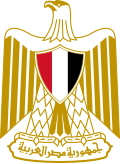 | |
Eritrea | Egypt |
|---|---|
Relations between Eritrea and Egypt refer to relations between the State of Eritrea and the Arab Republic of Egypt. Egypt recognized Eritrea shortly after the country became independent in 1991. Eritrea has supported Egypt in disputes pertaining to water rights in the Nile. [1]
Contents
Leaders from both countries have met with one another, with Eritrean president Isaias Afwerki and Egyptian president Abdel Fattah el-Sisi meeting in 2024 to discuss security and economic matters. [2]

